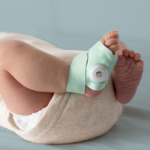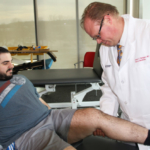Self-care and exercise effective in managing knee conditions
Self-care is a concept widely applied across healthcare and can be broadly defined as “what people do for themselves to establish and maintain physical and emotional health and prevent or deal with minor illness, injury, or chronic conditions”. This incorporates concepts such as exercise, hygiene, nutrition, medication, and environmental and socioeconomic factors.
Treatment techniques that have been incorporated into self-care programmes include: collaborative care plans between service users and healthcare professionals; setting goals that are reviewed and modified; helping individuals explore barriers to self-care; aiding people to monitor their symptoms and what action to take; providing advice and education; and coaching and peer support from other service users. For musculoskeletal conditions, self-care programmes have been developed and evaluated for knee osteoarthritis, but their effectiveness is considered limited, due to methodological weaknesses in study designs.

15 Self-Care Habits to Help You Achieve Your Wellness Goals. Pamela Peake MD
| Objective. |
| Treatment of knee conditions should include approaches to support self-care and exercise based inter- ventions. The most effective way to combine self-care and exercise has however not been determined sufficiently. Therefore the aim was to evaluate the clinical effectiveness of self-care programmes with an exercise component for individuals with any type of knee conditions. |
| Methods |
| A keyword search of Medline, CINAHL, Amed, PsycInfo, Web of Science, and Cochrane databases was conducted up until January 2015. Two reviewers independently assessed manuscript eligibility against inclusion/ exclusion criteria. Study quality was assessed using the Downs and Black quality assessment tool and the Cochrane Risk of Bias Tool. Data were extracted about self-care and exercise intervention type, control intervention, participants, length of follow-up, outcome measures, and main findings. |
| Results |
| From the 7392 studies identified through the keyword search the title and abstract of 5498 were screened. The full text manuscripts of 106 studies were retrieved to evaluate their eligibility. Twenty-one manuscripts met the inclusion/exclusion criteria. |
| Conclusion |
| The treatment potential of combined self-care and exercise interventions has not been maximised because of limitations in study design and failure to adequately define intervention content. Potentially the most beneficial self-care treatment components are training self-management skills, information delivery, and goal setting. Exercise treatment components could be strengthened by better attention to dose and progression. Modern technology to streamline delivery and support self-care should be considered. More emphasis is required on using self-care and exercise programmes for chronic condition prevention in addition to chronic condition management. |
effectiveness-of-self-care-interventions-with-an-exercise-component-to-manage-knee-conditions
The clinical effectiveness of self-care interventions with an exercise component to manage knee conditions: A systematic review, Kate Button, Paulien E. Roos, Irena Spasić, Paul Adamson and Robert W.M. van Deursena. Knee. 2015 Oct; 22(5): 360–371. doi: 10.1016/j.knee.2015.05.003
Self-management education programmes for osteoarthritis, Kroon FP, van der Burg LR, Buchbinder R, Osborne RH, Johnston RV, Pitt V. Cochrane Database Syst Rev. 2014 Jan 15;(1):CD008963. doi: 10.1002/14651858.CD008963.pub2.
Also see
How-to Exercise With Arthritis in Arthritis Foundation
15 Self-Care Habits to Help You Achieve Your Wellness Goals in The Peake Permformance Center for Healthy Living
10 Strengthening Exercises To Relieve Knee Pain in Positive Health Wellness






